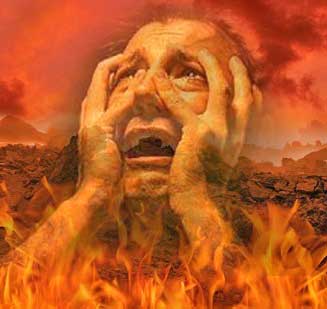I just gave Christianity Today my “what for” after reading their April 2002 “Good Question” column by J. I. Packer who was asked “How will people in heaven feel, knowing some of their loved ones are stuck in eternal hell?” Packer said the people in heaven will be too busy praising God and loving each other to worry about that sort of thing. In fact, Packer added, “love and pity for hellʼs occupants will not enter our hearts.”
So, I HAD to write

Hellʼs Final Enigma or “The Abominable Fancy” Redux?
There is nothing more horrific to my mind than J.I. Packerʼs recent response to this monthʼs “Good Question.” His response was that throughout eternity, “love and pity for hellʼs occupants will not enter our hearts.” Such a “love” is no better than any in-group who naturally love themselves and do not allow love or pity for “outsiders” to ever enter their hearts, and it echoes the horrific teachings of theologians from Augustine onward:
Augustine
They who shall enter into [the] joy [of the Lord] shall know what is going on outside in the outer darkness…The saintsʼ… knowledge, which shall be great, shall keep them acquainted…with the eternal sufferings of the lost.
[The City of God, Book 20, Chapter 22, “What is Meant by the Good Going Out to See the Punishment of the Wicked” & Book 22, Chapter 30, “Of the Eternal Felicity of the City of God, and of the Perpetual Sabbath”]
Tertullian
What a spectacle…when the world…and its many products, shall be consumed in one great flame! How vast a spectacle then bursts upon the eye! What there excites my admiration? What my derision? Which sight gives me joy? As I see…illustrious monarchs… groaning in the lowest darkness, Philosophers…as fire consumes them! Poets trembling before the judgment-seat of…Christ! I shall hear the tragedians, louder-voiced in their own calamity; view play-actors…in the dissolving flame; behold wrestlers, not in their gymnasia, but tossing in the fiery billows…What inquisitor or priest in his munificence will bestow on you the favor of seeing and exulting in such things as these? Yet even now we in a measure have them by faith in the picturings of imagination. [De Spectaculis, Chapter XXX]
Thomas Aquinas
In order that the happiness of the saints may be more delightful to them and that they may render more copious thanks to God for it, they are allowed to see perfectly the sufferings of the damned…So that they may be urged the more to praise God…The saints in heaven know distinctly all that happens…to the damned.
[Summa Theologica, Third Part, Supplement, Question XCIV, “Of the Relations of the Saints Towards the Damned,” First Article, “Whether the Blessed in Heaven Will See the Sufferings of the Damned…”]
Jonathan Edwards
The sight of hell torments will exalt the happiness of the saints forever…Can the believing father in Heaven be happy with his unbelieving children in Hell… I tell you, yea! Such will be his sense of justice that it will increase rather than diminish his bliss.
[“The Eternity of Hell Torments” (Sermon), April 1739 & Discourses on Various Important Subjects, 1738]
During Americaʼs “Great Awakening” the popular hymn writer, Isaac Watts (1674-1748), even set Christiansʼ feet to tapping with this crisp little verse:
What bliss will fill the ransomed souls,
When they in glory dwell,
To see the sinner as he rolls,
In quenchless flames of hell.
This “abominable fancy” was based on various Bible verses:
The righteous shall rejoice when he sees the vengeance.
- Psalm 58:10
Let the wicked perish at the presence of God…But let the righteous…rejoice before God: yea, let them exceedingly rejoice.- Psalm 68:2-3,22-23
In Isaiah 30:31-33 a human sacrifice takes place (the “man” who is killed represents the nation of Assyria), and the act is accompanied by festival songs, gladness of heart, the sound of the flute, tambourines and lyres. Moreover, “the Lord” performs the sacrifice.
And they shall go forth, and look upon the carcasses of the men that have transgressed against me.
- Isaiah 66:24
A man suffering in “Hades” sees another man luxuriating in “Abrahamʼs bosom,” and vice versa.
- Luke, chapter 16
Ye shall see Abraham, and Isaac, and Jacob, and all the prophets, in the kingdom of God, and you yourselves thrust out.
- Luke 13:28
They shall be tormented with fire and brimstone in the presence of the holy angels, and in the presence of the Lamb: And the smoke of their torment shall ascend up forever and ever…Rejoice over her, thou heaven, and ye holy apostles and prophets; for God hath avenged you on her… And again they said, Alleluia. And her smoke rose up for ever and ever.
- Revelation 14:9-11; 18:20, 19:3
Having such “inspired” verses behind it, this teaching did not grow out of favor with orthodox Christian theologians until the age of the Enlightenment when, for instance, Thomas Burnet punctured it with a prick of irony:
What a theater of providence this is: by far the greatest part of the human race burning in flames forever and ever. Oh what a spectacle on the stage, worthy of an audience of God and angels! And then to delight the ear, while this unhappy crowd fills heaven and earth with wailing and howling, you have a truly divine harmony. [De Statu Mortuorum & Resurgentium Tractatus, 1720]


No comments:
Post a Comment